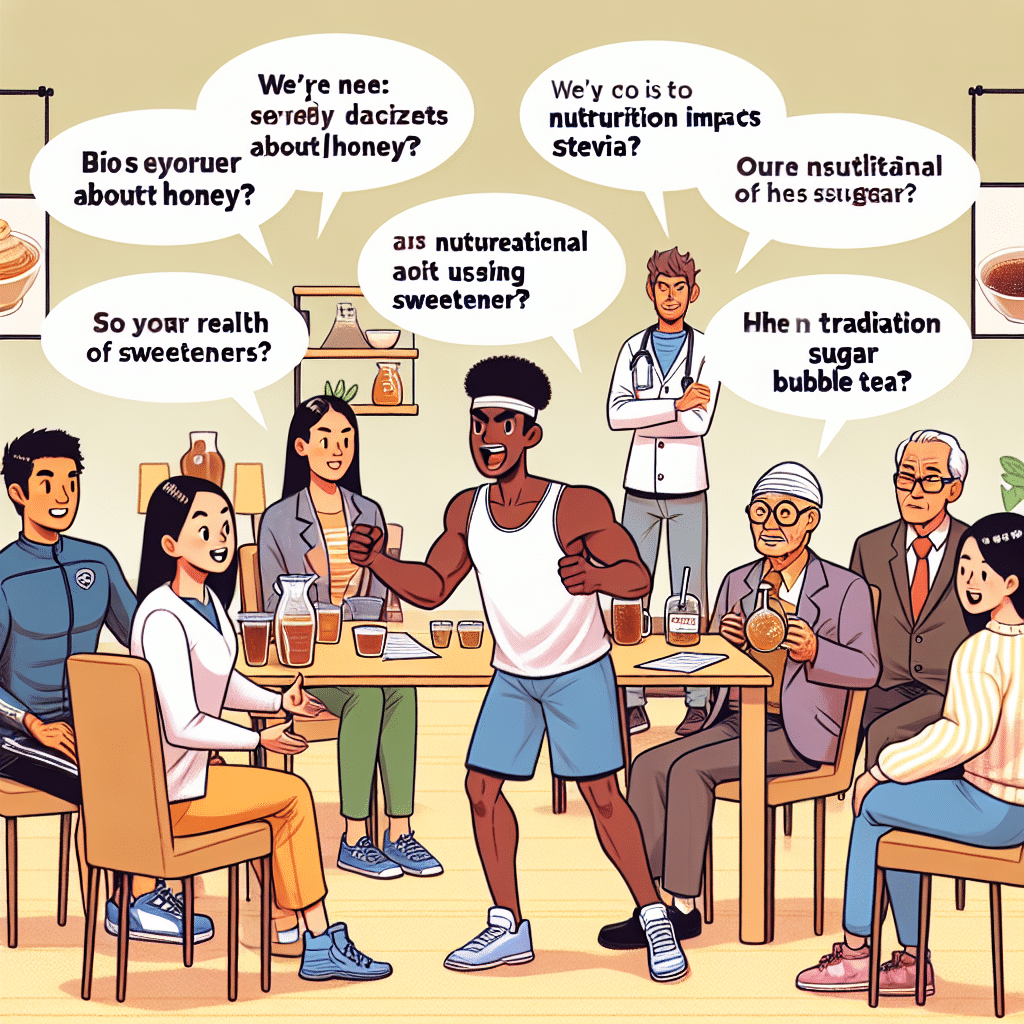Consumers Reveal Their Attitudes Toward Different Sweeteners
-
Table of Contents
- Consumer Attitudes Toward Various Sweeteners: A Deep Dive
- The Sweetener Spectrum: From Natural to Artificial
- Perceptions of Natural Sweeteners
- Artificial Sweeteners: A Mixed Bag of Opinions
- Sugar Alcohols and Novel Sweeteners: The Middle Ground
- Impact on Consumer Choices and Industry Response
- Case Studies and Statistics: Sweeteners in the Spotlight
- Conclusion: Key Takeaways on Sweetener Attitudes
- Discover ETprotein’s Protein Products
Consumer Attitudes Toward Various Sweeteners: A Deep Dive

In the realm of food and beverage consumption, sweeteners play a pivotal role in shaping the taste and appeal of countless products. From the sugar in your morning coffee to the high-fructose corn syrup in soft drinks, sweeteners are ubiquitous. However, as health consciousness rises and information becomes more accessible, consumers are increasingly scrutinizing the sweeteners in their diets. This article explores the attitudes consumers hold toward different sweeteners, examining preferences, perceptions, and the impact on purchasing decisions.
The Sweetener Spectrum: From Natural to Artificial
Consumers today are faced with a plethora of sweetener options, each with its own profile and purported benefits or drawbacks. The spectrum ranges from natural sweeteners like honey and maple syrup to artificial sweeteners such as aspartame and sucralose. In between, there are sugar alcohols like xylitol and erythritol, and novel sweeteners like stevia and monk fruit extract.
Perceptions of Natural Sweeteners
Natural sweeteners generally enjoy a positive reputation among consumers. Many perceive them as healthier and more wholesome than their artificial counterparts. Here’s a look at some common attitudes:
- Honey: Often associated with health benefits and natural remedies, honey is favored for its flavor and perceived nutritional value.
- Maple Syrup: Seen as a natural and minimally processed option, maple syrup is often chosen for its unique taste and as a vegan alternative to honey.
- Agave Nectar: Popular among vegans and those looking for a low-glycemic index sweetener, agave nectar is praised for its sweetness and consistency.
Artificial Sweeteners: A Mixed Bag of Opinions
Artificial sweeteners are often chosen for their low or zero-calorie content, but they also face significant scrutiny and skepticism. Consumer attitudes vary widely:
- Aspartame: While appreciated for its ability to reduce calorie intake, aspartame is also the subject of health concerns and conspiracy theories, leading to a polarized view.
- Sucralose: Known for its stability in heat, sucralose is a common choice for cooking and baking. However, some consumers are wary of its chemical origins.
- Saccharin: One of the oldest artificial sweeteners, saccharin has fallen out of favor with some due to its aftertaste and controversial health studies.
Sugar Alcohols and Novel Sweeteners: The Middle Ground
Sugar alcohols and novel sweeteners often serve as a compromise between natural and artificial sweeteners, offering reduced calories without synthetic origins. Consumer attitudes here are generally positive, with a few reservations:
- Xylitol: Valued for its dental benefits and low glycemic impact, xylitol is popular in chewing gums and toothpaste, though some are concerned about its gastrointestinal side effects.
- Erythritol: With minimal calories and no impact on blood sugar, erythritol is well-received, especially among those on ketogenic diets, despite some digestive concerns.
- Stevia: As a plant-based sweetener with no calories, stevia has a strong following, although some dislike its aftertaste and question its processing methods.
- Monk Fruit Extract: Praised for its natural origins and zero-calorie sweetness, monk fruit extract is gaining popularity, though it is less widely available and more expensive.
Impact on Consumer Choices and Industry Response
The attitudes consumers hold toward sweeteners significantly influence their purchasing decisions. Health-conscious shoppers may opt for products labeled as “sugar-free” or “no artificial sweeteners,” while those with dietary restrictions might seek out “keto-friendly” or “diabetic-safe” options. The food and beverage industry has responded by reformulating products, offering a wider range of sweetener choices, and highlighting sweetener-related claims on packaging.
Case Studies and Statistics: Sweeteners in the Spotlight
Several case studies and surveys have shed light on consumer attitudes toward sweeteners. For instance, a study by the International Food Information Council Foundation found that taste and healthfulness are the top factors influencing sweetener preferences. Another survey by Mintel revealed that nearly half of American consumers are trying to reduce their sugar intake, with many turning to alternative sweeteners.
Conclusion: Key Takeaways on Sweetener Attitudes
In conclusion, consumer attitudes toward sweeteners are diverse and nuanced. Natural sweeteners are generally viewed favorably for their perceived health benefits, while artificial sweeteners receive mixed reactions due to health concerns. Sugar alcohols and novel sweeteners offer a middle ground that appeals to many, though they are not without their own issues. Ultimately, personal preferences, health goals, and dietary needs shape consumer choices, and the industry must continue to adapt to these evolving demands.
Discover ETprotein’s Protein Products
For those seeking health-conscious dietary options, ETprotein offers a range of high-quality protein products. Their selection includes organic and clear proteins from rice, pea, watermelon seed, pumpkin seed, sunflower seed, mung bean, and peanut sources. These non-GMO, allergen-free proteins are ideal for various industries, including nutraceuticals, sports nutrition, and more. ETprotein’s commitment to quality and customer satisfaction makes them a top choice for protein needs.
About ETprotein:
ETprotein, a reputable protein and L-(+)-Ergothioneine (EGT) Chinese factory manufacturer and supplier, is renowned for producing, stocking, exporting, and delivering the highest quality organic bulk vegan proteins and L-(+)-Ergothioneine. They include Organic rice protein, clear rice protein, pea protein, clear pea protein, watermelon seed protein, pumpkin seed protein, sunflower seed protein, mung bean protein, peanut protein, and L-(+)-Ergothioneine EGT Pharmaceutical grade, L-(+)-Ergothioneine EGT food grade, L-(+)-Ergothioneine EGT cosmetic grade, L-(+)-Ergothioneine EGT reference grade and L-(+)-Ergothioneine EGT standard. Their offerings, characterized by a neutral taste, non-GMO, allergen-free attributes, with L-(+)-Ergothioneine purity over 98%, 99%, cater to a diverse range of industries. They serve nutraceutical, pharmaceutical, cosmeceutical, veterinary, as well as food and beverage finished product distributors, traders, and manufacturers across Europe, USA, Canada, Australia, Thailand, Japan, Korea, Brazil, and Chile, among others.
ETprotein specialization includes exporting and delivering tailor-made protein powder and finished nutritional supplements. Their extensive product range covers sectors like Food and Beverage, Sports Nutrition, Weight Management, Dietary Supplements, Health and Wellness Products, and Infant Formula, ensuring comprehensive solutions to meet all your protein needs.
As a trusted company by leading global food and beverage brands and Fortune 500 companies, ETprotein reinforces China’s reputation in the global arena. For more information or to sample their products, please contact them and email sales(at)ETprotein.com today.












